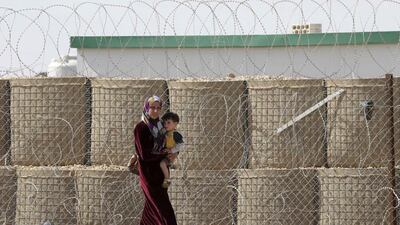BEIRUT // Heavy fighting between rival Islamic rebel groups in eastern Syria has killed 62 fighters and forced tens of thousands to flee their homes over several days of violence, activists said yesterday.
Meanwhile, Syria’s supreme constitutional court announced president Bashar Al Assad and two others will be the candidates in a coming June presidential election that Mr Al Assad is widely expected to win.
Rebels from the Al Qaeda breakaway group known as the Islamic State of Iraq and the Levant and fighters of the Al Qaeda-linked Nusra Front have fought each other for months over territory they previously captured together from Mr Al Assad’s forces.
The rebel-on-rebel violence has raged in the north along the Turkish border that opposition fighters have controlled since a mid-2012 offensive. Earlier this year, it spread to eastern Syria, home to most of the country’s oilfields.
The Britain-based Syrian Observatory for Human Rights said yesterday’s rebel infighting took place around three villages in the oil-rich Deir Ezzor province near the Iraqi border. In the past four days, 62 rebels have been killed there, the observatory said.
The rebel infighting has forced tens of thousands to flee the contested villages of Abreeha, Bseera and Sabha, said the observatory, which gathers information through a network of activists on the ground.
Syria’s conflict, which began with largely peaceful protests in March 2011, has evolved into a civil war with sectarian overtones that activists say has killed more than 150,000 people. Islamic extremists, including foreign fighters and Syrian rebels who have taken up hard-line Al Qaeda-style ideologies, have played an increasingly prominent role, dampening the West’s support for the rebellion to overthrow Mr Al Assad.
That has led to a backlash by Islamic brigades and more moderate rebels who launched a war against the Al Qaeda breakaway group the Islamic State of Iraq and the Levant. Fighting between opposing rebel groups has killed more than 3,000 people since the beginning of the year, activists say.
In Damascus, the spokesman for the country supreme constitutional court, Majid Khadra, announced yesterday that only three of 24 applicants met legal requirements to run in the June 3 presidential election. Mr Al Assad, who is seeking a third seven-year term, will face Hassan bin Abdullah Al Nouri, a 54-year-old legislator from Damascus, and 43-year-old Maher Abdul Hafiz Hajjar, a politician from the northern city of Aleppo.
Opposition activists and western countries have condemned the elections as a sham. Voting is expected to be held only in government-controlled territory.
In Homs, a rebel negotiator said yesterday that a deal had been reached with the government to allow opposition fighters, civilians and wounded people the army-besieged city.
“An agreement occurred between representatives of the rebels and the chiefs of security, in the presence of the Iranian ambassador, for the pullout of fighters from the Old City to the northern countryside of Homs,” Abul Hareth Al Khalidi said.
Talks are now focused on implementation, he said.
Homs was dubbed the “capital of the revolution” at the start of the 2011 uprising against Mr Al Assad.
About 2,250 people, mostly fighters, will evacuate the Old City area, according to a version of the agreement obtained from an opposition source by Agence France Presse.
Mr Abul Harith said civilians and wounded people would also be evacuated from the Old City, much of which has been destroyed by bombardment and fighting.
According to the agreement, fighters will withdraw to a rebel-controlled area in the north of Homs province. They will be allowed to carry light weapons, and one rocket launcher will be permitted on every bus used for the evacuation.
“The guarantors will be the presence of members of the United Nations and Iranian negotiators on the buses,” the agreement says.
The deal was reached as part of an exchange for an unknown number of Iranian and Lebanese prisoners currently held by the Islamic Front, Syria’s largest rebel alliance.
“Implementation will begin after those being held by the Islamic Front are released, and after permission is given to allow relief to enter the [pro-regime] towns of Nubol and Zahraa in Aleppo province,” according to the text.
* Associated Press and Agence France-Presse

